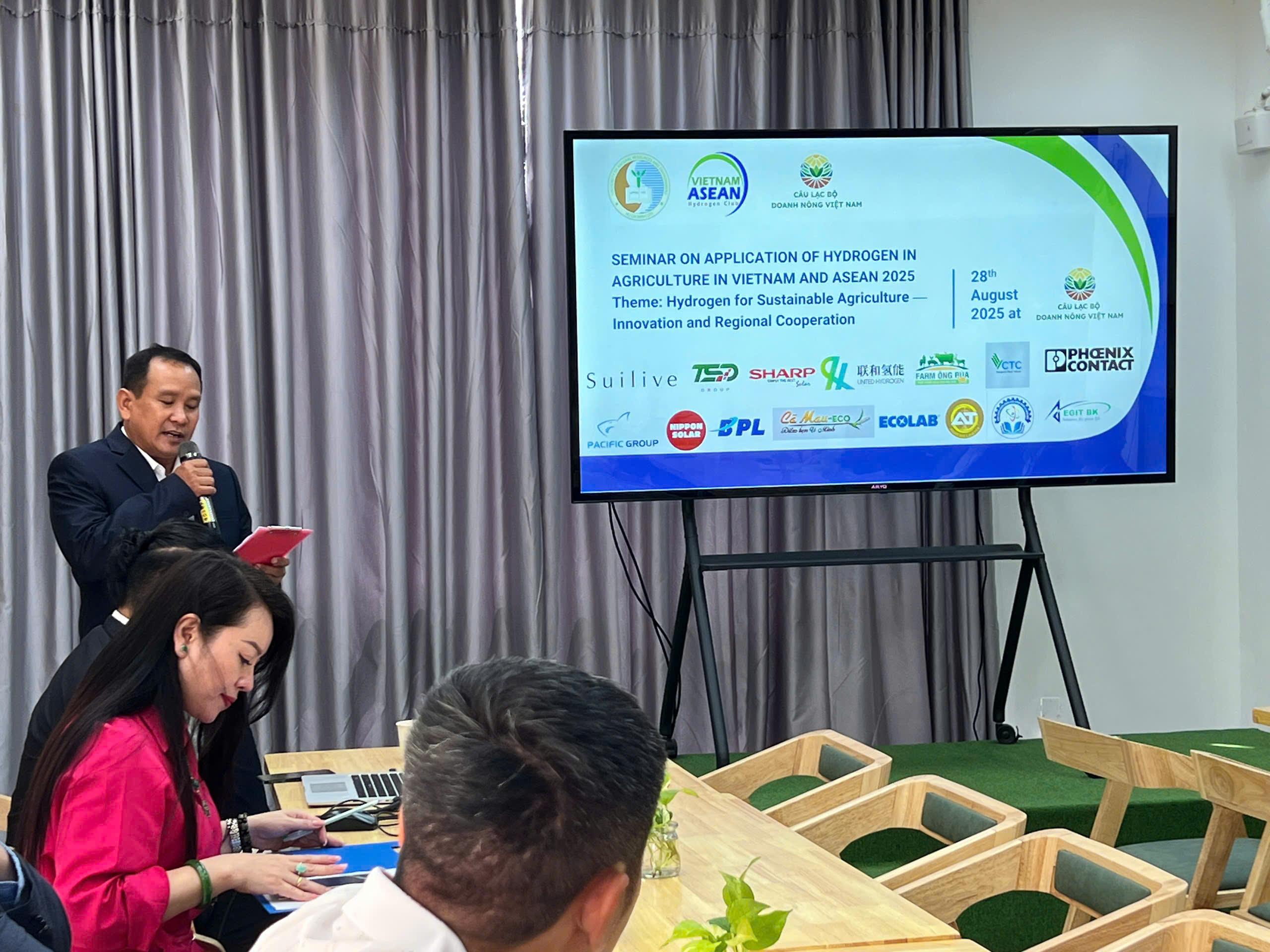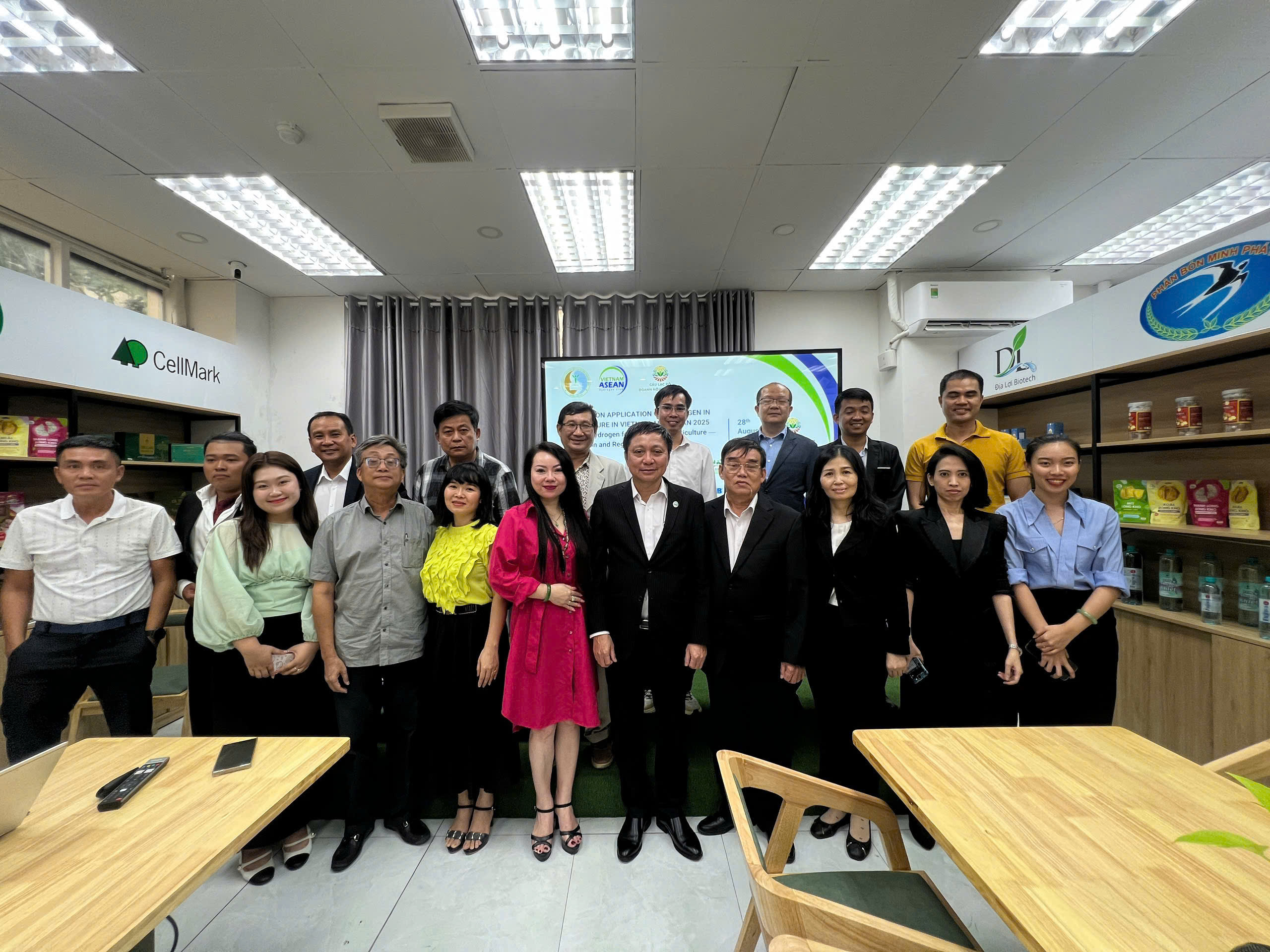Hydrogen Rich Water in Agriculture: Enhancing Yield, Sustainability, and Resilience
By Ianton Tan, Regional Director, Asia-Pacific, United Hydrogen (Singapore)
The Review is from Mr. Tan's video's presentation at the Seminar on Hydrogen Application to Agiculture in Vietnam and ASEAN held by VAHC, VAC and HCMUNRE on August 28 2025 at the Office of Ministry of Agriculture and Environment in the South of Vietnam
Mr. ianton Tan, Head of APAC, United Hydrogen, based in Singapore
Agriculture today faces unprecedented challenges. Climate change, soil degradation, water scarcity, and disease pressures all threaten food production and farmers’ livelihoods. At United Hydrogen, we believe hydrogen can play a transformative role in addressing these issues by enhancing plant resilience, improving yields, and enabling more sustainable farming systems.
In this article, I would like to share how our team has been applying hydrogen-based technologies in agriculture, what results we have achieved, and where we see the future of hydrogen in food production and livestock management.
United Hydrogen’s Vision
United Hydrogen is pioneering the hydrogen revolution by linking hydrogen production with practical, real-world applications. In the agriculture sector, our goal is clear: to provide sustainable and efficient hydrogen solutions that strengthen crop and livestock health, reduce reliance on chemicals, and improve farm productivity.
While many here are familiar with hydrogen’s role in energy, fewer may know about its biological benefits. At the cellular level, hydrogen supports mitochondria—the “power plants” of cells that generate ATP (adenosine triphosphate). By boosting mitochondrial function, hydrogen increases resilience to environmental stress. This principle applies not only to humans and animals, but also to crops.

The delegates attending the Seminar
Stress Factors Hydrogen Can Address
Agriculture systems worldwide are increasingly vulnerable to:
-
Salinity and alkaline soils
-
Drought and water scarcity
-
Heavy metals in irrigation water
-
Viral outbreaks in crops and livestock
Hydrogen-infused water helps mitigate these stresses, protecting plants and animals under harsh conditions where conventional methods often fail.
Case Studies: Hydrogen in Crops
Rice
In rice cultivation, hydrogen-infused irrigation has delivered yield increases of up to 20% compared to conventional methods. Under extreme weather conditions where normal irrigation systems struggle, yields have increased by more than 50%.
Wheat
Field studies in China showed that wheat irrigated with hydrogen-rich water achieved a 12% yield increase, with quality also improving—protein hardness rose by 4%, and overall quality ratings by 15%.
Strawberries & Blueberries
Strawberry yields improved by 39%, while blueberry production rose by more than 19%. Importantly, strawberries treated with hydrogen water were not only larger but sweeter—taste panels reported a 150% improvement in perceived aroma and flavor. Blueberries, known for their fragility, became firmer and lasted longer in storage.
Tomatoes & Vegetables
Hydrogen irrigation increased lycopene content by 17% in tomatoes, enhancing antioxidant benefits. For leafy greens, protein content rose by 34%, with marked increases in vitamins B and C.
In summary, hydrogen-enriched water enhances stress resistance, boosts growth and yield, improves taste and quality, extends freshness, reduces fertilizer and pesticide reliance, and supports long-term soil health.
Technology Generations
First Generation
Our first-generation system used external hydrogen tanks to infuse irrigation water. It delivered around 5 tons per hour, was compact (about 150 kg), and portable—farmers could move it easily between fields.
Second Generation
We then advanced to nanobubble electrolysis technology, which generates hydrogen nanobubbles directly without external tanks. This system is lighter, more mobile, and produces hypochlorous acid, a safe disinfectant. Nanobubbles also stabilize hydrogen concentrations, increasing effectiveness.
Third Generation (Current)
Our latest model integrates:
-
Hydrogen and oxygen nanobubbles
-
Continuous hypochlorous acid production for natural disinfection
-
Bioceramics, enhancing antioxidant properties and water penetration
This version supports crop irrigation, aquaculture, and water treatment applications with higher efficiency and broader impact.
Beyond Crops: Hydrogen in Livestock & Aquaculture
Hydrogen water is proving equally valuable in animal farming. In aquaculture, it combats ammonia-nitrogen accumulation, intestinal injury, viral infections, and overuse of antibiotics. Fish raised in hydrogen-rich water exhibit better metabolism, lower disease incidence, and higher survival rates.
Livestock Trials
In case studies with pigs, cattle, sheep, and goats:
-
Cholesterol and creatinine levels in pregnant goats were reduced.
-
Lamb survival rates improved to 100%, compared with 87% in the control group.
-
Diarrhoea cases fell significantly, and mothers recovered faster.
-
Meat quality improved with better water retention and freshness.
Hydrogen water also reduces inflammation, decreases reliance on antibiotics, and enhances feed utilization. Ultimately, it supports healthier, more organic livestock production.
Broader Benefits
Across crops and livestock, the Hydrogen+ solutions deliver:
-
24-hour oxygenation of water
-
Natural disinfection with hypochlorous acid
-
Reduced dependence on chemicals and antibiotics
-
Lower operational and maintenance costs
-
Higher survival rates and yields
-
Stronger farm productivity and profitability

The delegates took group photo at the send of the Seminar
Conclusion
At United Hydrogen, we see hydrogen as more than just an energy vector—it is a life-supporting element with immense potential in agriculture. By improving soil fertility, crop resilience, and livestock health, hydrogen can help farmers adapt to climate change while producing healthier, more sustainable food.
We are committed to working with partners across Asia and globally to advance these technologies, ensuring a cleaner, brighter, and more resilient future for agriculture.
For further discussions or technical details, please feel free to connect through the Vietnam Association for Hydrogen and Clean Energy (VAHC), who kindly hosted this presentation.






